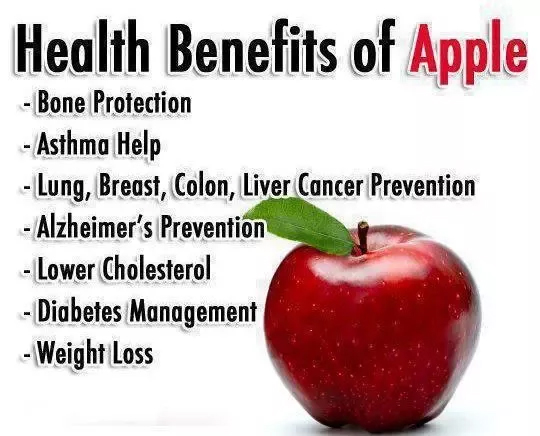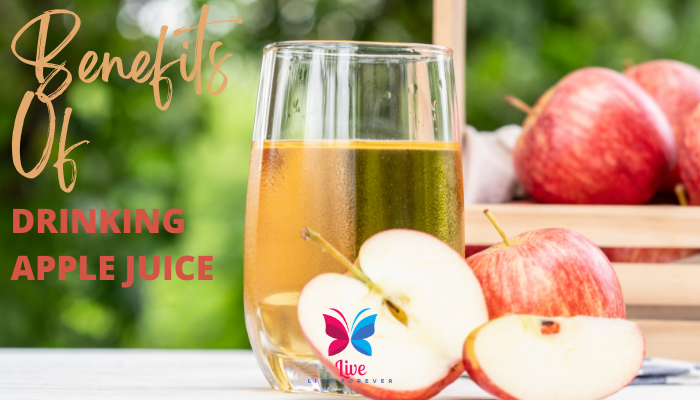What are the benefits of drinking apple juice – The effects and functions of apple juice


Benefits of Drinking Apple Juice
What are the benefits of drinking apple juice – Apples are a very healthy food, but there are pros and cons to apple juice. When you juice apples, you enhance their moisturizing properties, capturing a host of beneficial plant compounds in the process.However, juicing reduces the other benefits of the whole apple, including fiber and its ability to satisfy hunger. Here are 4 benefits and 5 disadvantages of drinking apple juice.
What are the benefits of drinking apple juice?
1. Replenish moisture
Apple juice contains 88% water and tastes great It’s convenient to consume, especially for those who are unwell and more prone to dehydration. Pediatricians suggest a solution for mildly dehydrated, sick children aged at least one year: a blend of half-strength apple juice and water. Although electrolyte drinks are specially formulated to rehydrate, some children don’t like the taste and won’t drink them. Diluted apple juice is a practical and enjoyable alternative suitable for both children and adults.
Be sure to drink diluted juice to stay hydrated, as the high sugar content of full-strength juice can draw excess water into the intestines and worsen diarrhea —especially while recovering from an illness Apple juice contains potassium levels akin to electrolyte beverages, yet it’s low in sodium, a mineral lost when the body is unwell and fluids are depleted. Apple juice has high water content and good taste, making it a good choice for hydration. To avoid side effects, dilute it to half when using it to rehydrate after illness.
2. Plant compounds
Apples are rich in plant compounds, especially polyphenols. While most of these compounds are in the peel, some of the apple pulp remains in the juice. These natural compounds shield your cells against inflammation and oxidative harm. Both processes are potential factors in chronic diseases, including certain cancers and heart disease.
Healthy men drank 160 ml of apple juice, and then their blood was drawn Their blood showed reduced oxidative damage within just 30 minutes of consuming the juice, with the positive effects lingering for up to 90 minutes.. For more polyphenols, choose cloudy juices that contain pulp rather than clear juices that have the pulp removed. Cloudy apple juice has 62% more polyphenols than clear juice.
3. Protect heart health
The plant compounds in apple juice—including polyphenols—may be particularly beneficial to heart health. Polyphenols prevent LDL (bad) cholesterol from being oxidized and building up in the arteries. Higher levels of oxidized LDL are associated with an increased risk of heart attack and stroke.
When healthy adults drank 375 ml of clear apple juice daily for 6 weeks, their LDL (bad) cholesterol was 20% more resistant to oxidation than at the start of the study. In addition, when healthy women drank 310 ml of clear apple juice, antioxidant activity in their blood increased by nearly 11% within 1 hour of drinking the juice. This increase in antioxidant activity means more potential protection against heart disease.
4. Protect the brain
Preliminary research suggests that apple juice may help brain function and mental health as we age. Part of this protective effect may be due to the antioxidant activity of polyphenols found in the juice. They protect your brain from damage from unstable molecules called free radicals. Additionally, when Alzheimer’s patients drank 1 cup (240 ml) of apple juice per day for 1 month, their behavioral and psychiatric symptoms—such as anxiety, irritability, and false beliefs—improved by 27%. Apple juice may help protect memory and other aspects of brain health during aging. Research shows it may improve behavioral and mental health in Alzheimer’s disease.
5 Disadvantages of Apple Juice
Juicing apples loses some of its benefits and poses potential health risks. Here are the top 5 problems associated with drinking apple juice, along with ways to overcome some of them.
1. May cause weight gain
If you drink apple juice, portion control is essential. A 1 cup (240 ml) serving of apple contains 114 calories, while a medium apple contains 95 calories. Juice can be consumed faster than a whole apple, which can result in you consuming a lot of calories in a short period of time.
Additionally, juice isn’t particularly good at satisfying hunger or helping you feel full. This may cause you to consume too many calories. Depending on the calories, adults were given equal amounts of whole apples, applesauce, or apple juice. Whole apples are the best way to satisfy their hunger. Juice is the least filling – even with added fiber. For these reasons, drinking juice carries a greater risk of consuming excess calories and gaining weight than eating a whole apple. This is true for both adults and children.

The Academy of Pediatrics recommends the following daily juice limits:
| age | Juice limit |
| 1–3 | 120 ml |
| 3–6 | 120–175 ml |
| 7–18 | 240 ml |
One cup (240 ml) is also the recommended daily limit for adults.
2. Low vitamin and mineral content
One 8-ounce serving (240 ml) of apple juice lacks substantial vitamins and minerals, falling short of fulfilling at least 10% of the recommended daily intake value for any micronutrient. That said, vitamin C – or ascorbic acid – is usually added. In many cases, apple juice is fortified to provide 100% or more of the daily value of vitamin C per serving. If not fortified, each serving of apple juice provides approximately 2% of the daily value of this vitamin. By comparison, a medium-sized apple provides an average of 9% of your daily value. If you eat a variety of whole fruits and vegetables, you can easily meet your vitamin C quota without drinking fortified juices.
3.High sugar – low fiber
Choose 100% juice varieties instead of drinks that are a mix of apple juice, added sugar, and water. Still, nearly 100 percent of all the calories in apple juice come from carbohydrates—mainly from fructose and glucose, two natural sugars.
Meanwhile, a 1-cup (240 ml) serving of juice—whether clear or cloudy—provides only 0.5 grams of fiber. By comparison, a medium apple with the skin on contains 4.5 grams of fiber—or 18 percent of your daily value—for this nutrient. Fiber, along with protein and fat, helps slow digestion and promotes moderate increases in blood sugar. The combination of high sugar and low fiber in juice can cause your blood sugar to spike.
If you drink apple juice, pair it with something that contains protein and healthy fats to reduce its impact on your blood sugar. For example, when healthy adults ate apple juice, bread, and peanut butter for breakfast, their blood sugar rose by 30 percent less than when the same meal did not include peanut butter.
4.Promotes tooth decay
Drinking fruit juice is linked to tooth decay. Bacteria in your mouth consume the sugars in the juice and produce acids that erode tooth enamel and lead to cavities. Apple juice was found to be the most corrosive to tooth enamel. If you drink apple juice, avoid swishing it in your mouth. The longer your teeth are exposed to sugar, the greater the likelihood of tooth decay. The use of straws is also recommended to reduce the risk of tooth decay.
5.Contaminated by pesticides
Pesticide contamination is also a concern if you drink non-organic juice. Pesticides are chemicals used to protect crops from insects, weeds and mold. But children are more susceptible to the effects of pesticides than adults. If your child regularly drinks apple juice, it’s best to choose organic. Organic juice is also better for adults because long-term exposure to small amounts of pesticides is not known to increase the risk of certain cancers, fertility problems, or other health problems.
The functions and effects of apple juice
The role of apple juice
- Apples are rich in tannic acid, malic acid, organic acids, pectin, cellulose and other substances, which have astringent effects. The pectin and cellulose have the effect of absorbing bacteria and toxins, so they can benefit the intestines and stop diarrhea.
- Apple juice can relieve constipation. The organic acids and fiber in apples can promote intestinal peristalsis and make stools soft and easier to excrete.
- Suitable for pregnant women. For women with severe pregnancy reactions, using apple juice can not only supplement calories and vitamins, but also adjust the balance of water, salt and electrolytes to prevent acidosis caused by frequent vomiting.
- Can prevent and treat high blood pressure. Apples contain more potassium and less sodium. The potassium in apples can combine with excess sodium in the body and excrete it from the body. Therefore, regular drinking of apple juice is good for patients with high blood pressure.
- It can increase appetite and benefit the growth of babies. The soluble phosphorus and iron contained in apples are easy to digest and absorb, contribute to the growth and development of infants, and can also prevent the occurrence of rickets in infants. At the same time, apple juice can also help you lose weight. Apple juice contains a lot of vitamins and malic acid, which can promote the decomposition of fat stored in the human body. Regular use of apple juice can prevent obesity.
Apple juice benefits
Some of the Benefits of Drinking Apple Juice are :
- For intestinal cleansing and detoxification, drinking apple juice can absorb a variety of vitamins and minerals, as well as some insoluble fiber. This fiber can absorb water and swell after entering the intestines, which can clean up the accumulated garbage and toxins on the human intestinal wall, and can Speeding up intestinal peristalsis, shortening the defecation time of the human body, and allowing the garbage in the human intestinal tract to be excreted with the stool.
- Prevent high blood pressure. Drinking more apple juice can prevent high blood pressure, because apples are a healthy drink with high potassium and low sodium. After entering the human body, the trace element potassium can combine with the sodium salt in the human body and speed up the body’s health. Internal sodium metabolism can prevent high blood pressure. In addition, people who drink more apple juice can also maintain the balance of electrolytes in the body and prevent diseases caused by electrolyte imbalance.
- Lowering cholesterol, apple juice can also purify the blood, clean up cholesterol in the blood, and prevent the human body from developing hyperlipidemia due to excess cholesterol. In addition, drinking apple juice can also speed up the secretion of bile in the body and increase the production of bile acids. Function, it can prevent cholesterol from precipitating in human bile and prevent the formation of gallstones from the root.
How to squeeze delicious apple juice
1. Apple and pear juice
Ingredients: apples, pears, sugar, water.
Method
- Clean and peel the pear, then chop the flesh into pieces and set it aside.
- Next, wash the apples with water and remove the core.
- Put the apples and pears into the juicer, add appropriate amount of water and white sugar;
- Once the juice is ready, pour it into a cup.
- Apple Banana Juice
Ingredients: apples, bananas, sugar, water.
Method
- Clean the apples and extract the core.
- Peel the banana and cut it into segments;
- Put the bananas and apples into the juicer and pour in purified water;
- Add appropriate amount of sugar and complete the juice extraction;
- Pour into a cup and serve.
3. Apple Lemon Juice
Ingredients: Apple, lemon, water, honey.
Method
1. Wash the apples, remove the core, and soak in water for a few minutes;
- Wash the lemons, squeeze out the lemon juice and set aside;
- Put the apples into the juicer, pour in water, honey and lemon juice;
- When the juice is finished, pour it into a cup and drink.
Milk apple juice
Ingredients: 1 apple, a cup of yogurt, an appropriate amount of cold boiled water, an appropriate amount of raisins
Method
1. Prepare the materials first
- Peel the apple and cut into small pieces
- Put the cut apple pieces and yogurt into the food processor
- Mix in a suitable quantity of cold boiled water to ensure the extracted juice isn’t too dense.
- Plug in the power, press the juice function, and the juice will be squeezed out
- Use a spoon to remove the foam floating on the top, and add an appropriate amount of raisins, milk and apple juice.
Conclusion
Apple juice can be used to rehydrate you when you are sick. Its natural plant compounds, known for combating diseases, might also safeguard your heart and brain as you grow older. However, compared to whole apples, apple juice is not very filling and does not provide much fiber, vitamins, or minerals. If you’re a fan, opt for cloudy organic juice with pulp to maximize the beneficial plant compounds and steer clear of pesticide residue. Due to its higher calorie content, savor this juice in moderation.




